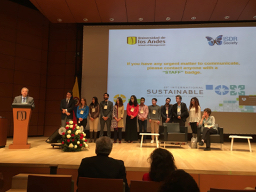Impressions of Track 5f on Sustainable value chains and trade in 2017 ISDRS conference
In the 23rd ISDRS Conference in Bogotá our track included 13 presentations with inputs from various parts of the world. Privately led instruments for introducing sustainability in value chains have become more present and diversified in recent years. In our sessions authors explored these different types of instruments, with particular emphasis on business-to-business models. Cases of direct trade and social enterprises, in which manufactures engage directly with suppliers, of fering a higher share of the value, were discussed. Interestingly, these examples are still supported on third-party certification, explicitly or implicitly.
fering a higher share of the value, were discussed. Interestingly, these examples are still supported on third-party certification, explicitly or implicitly.
Individualized strategies have extended their aimat producing not only economic value for providers and businesses but also social and environmental value, as the examples of collaboration and symbiosis among companies demonstrate. In spite of progress, these individualized strategies still struggle to produce scalable results. In many cases companies reach only a small percentage of providers, highlighting the role of broader, landscape-scale initiatives that engage multiple actors, including the state. Examples of these new actors and their roles were given in the cases of REDES program in Colombia and the School of Textiles in Germany. In both cases universities are playing a key role providing tools for learning, developing capabilities and increasing trust among participants.
Assessing the impact of private sustainability instruments presents several challenges, from access to information to robust and credible counterfactuals. Some of the presenters showed data towards this end, highlighting how value is distributed among actors in the network and what types of benefits are produced.